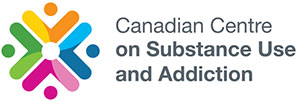
The Leadership Team at CCSA is responsible for ensuring CCSA achieves its strategic goals. The team develops strategic directions that align with the mandate of the organization and its core functions.
Alexander Caudarella, MDCM CCFP AM ABAM(d), Chief Executive Officer

Alexander is responsible for setting the strategic direction of the organization and its overall management. He is accountable for the performance of CCSA, its projects, programs, staff and associates. In partnership with the Chair, Alexander enables the Board of Directors to fulfill its governance role, and facilitates the optimum interaction between management and the Board of Directors. He also provides direction for the formulation of CCSA's mission, strategy and annual objectives, and leadership in their achievement.
Zeenat Chisti, CPA, CGA, MBA, Director, Finance

Kim Corace, PhD, C.Psych., Vice President, Innovation and Senior Scientist

Kim plays a crucial role in driving innovation and leading new partnerships to secure funding for groundbreaking projects involving use health and addiction. She provides visionary leadership to the Innovation and Evidence in Practice, and the Quality and Accountability streams. fostering a culture of creativity, collaboration, and excellence. Kim also leads the development and execution of strategic plans in Innovation to help advance the CCSA's mission.
Karen Cumberland, MPA, Vice President, Strategic Initiatives and Community Outreach

Karen oversees and provides leadership to the Data as Power, Health Promotion, and Convening Communities streams. She is responsible for framing policy and advancing initiatives to address national and international substance use health issues. Karen also fosters education, prevention and justice partnerships, and is working at expanding CCSA's international presence in substance use health issues.
François Gagnon, PhD, Senior Scientist and Special Policy Advisor

As a Senior Scientist, François leads CCSA’s efforts in substance use health and addiction research for the Developing Tomorrow stream. He also serves as a Special Policy Advisor, playing a pivotal role in shaping and guiding CCSA’s policies related to substance use health and addiction. Additionally, François provides expertise in helping securing funding through grant proposals.
David Haswell, Director, Information Systems and Web Services

The Director of Information Systems and Web Services optimizes the use of tools, systems and processes to ensure CCSA achieves its strategic goals by maximizing organizational efficiency and effective information management while improving information technology practices and support. They are also responsible for enhancing CCSA’s online presence, products and performance through developing informed technology strategies and innovative solutions.
Pam Kent, PhD, Director, Research and Emerging Trends

Pam is responsible for leading CCSA’s research portfolio and brings a specialized knowledge in the field of substance use health and addiction. She provides guidance and leadership to a team of research and policy analysts and information specialists. In collaboration with other streams at CCSA and external partners, Pam leads CCSA’s research activities, including primary and secondary research, research partnerships and the pursuit of external funding.
Susan Landry, CHRL, Director, Human Resources

Susan leads the design and implementation of progressive, innovative and cost-effective employee programs and practices. These programs and practices enhance CCSA’s work environment and culture to increase employee engagement. She support CCSA employees by delivering results in human resource policy development, performance management, professional development, staffing and compensation.
Rhowena Martin, Chief Impact Officer

Rhowena provides operational leadership and direction in implementing the organization’s mandate to address substance use and addiction. She gives ongoing strategic leadership and advice to the CEO, while using strong business and operational planning to cultivate organizational excellence and efficiency. She also oversees the Public Affairs and Communications, Information Systems and Web Services, Quality and Performance Measurement, Human Resources, Knowledge Mobilization and Research divisions.
Shawna Meister, MA, Associate Director, Innovation and Evidence in Practice

Shawna leads the broadening of CCSA’s innovative work to achieve impact in new and diversified areas and the transforming of evidence into practice through training and implementation, as well as the impaired-driving and the workplace and substance use health program areas. In collaboration with other streams, she provides guidance on qualitative research, training and implementation, as well as pursues external funding opportunities. Shawna builds collaborative partnerships when exploring new projects.
Heather Ochalski, MA, Director, Indigenous Partnerships and Strategies

Heather develops and nurtures collaborative relationships with First Nations, Métis and Inuit communities and organizations across Canada. She builds CCSA’s internal capacity to cultivate reciprocal relationships with these communities and organizations, and works closely with partners to create meaningful reconciliation initiatives. Heather works with the CCSA senior leadership team and staff to create and implement a strategic plan for developing a reconciliation framework. Heather also advises senior leadership on key emerging issues, themes, evidence and approaches specific to the shared priorities of CCSA in the context of First Nations, Métis and Inuit health and wellness.
C’Fine Ezeanochie Okorochukwu, MBBS, MPH, Director, Health Promotion and Prevention

C’Fine is responsible for leading CCSA’s multifaceted health promotion portfolio with special focus on alcohol, cannabis and gambling. He brings national leadership knowledge in the field of substance use health and provides guidance and leadership to a team of researchers and knowledge brokers. In collaboration with other divisions within CCSA and external partners, C’Fine leads CCSA’s research activities and knowledge mobilization in health promotion and prevention.
Isabelle Robillard, Director, Public Relations and Community Engagement

Isabelle leads the promotion of CCSA as Canada’s national, unique voice on substance-related issues. She uses a range of public affairs, government relations and communications services and advice to support this mandate. She also supports the strategic directions and activities of other divisions through marketing, communications, design, publishing and translation.
Adam Sherk, PhD, Senior Scientist and Special Policy Advisor

Adam leads CCSA’s efforts in substance use health and addiction research as the Senior Scientist for the Data as Power stream. He also serves as a Special Policy Advisor, playing a pivotal role in shaping and guiding CCSA’s policies related to substance use health and addiction. Additionally, Adam provides expertise in helping securing funding through grant proposals.
Sheena Taha, PhD, Associate Director, Quality and Accountability
Sheena leads and develops the highly collaborative diverse team in CCSA’s Quality and Accountability stream. She provides scientific direction and expertise in enhancing services that support individuals’ well-being and increasing access and availability to quality substance use health care. Sheena is also responsible for establishing strong working relationships and actively collaborating with key internal and external partners, with a particular focus on people experiencing health and social inequities.
John Weekes, PhD, Director, Knowledge Mobilization and Strategic Partnerships

John bridges the gap between what CCSA knows and what it does in the field of substance use health and addiction with his knowledge of mobilization techniques and experience. John ensures implementation and continuous improvement of the integrated knowledge mobilization framework, with a focus on encouraging the uptake of CCSA products. He leads the development of innovative knowledge mobilization strategies to maximize impact and uptake by a broad range of populations and formulates CCSA’s strategy to engage and collaborate meaningfully with diverse interest groups and organizations.
